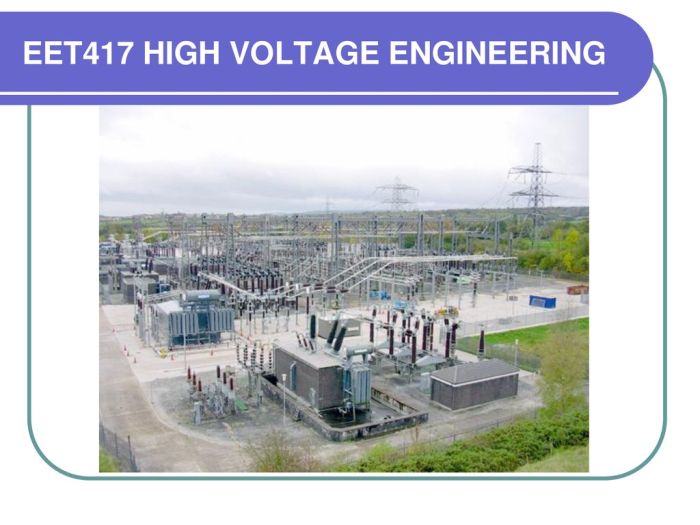High voltage engineering principles sets the stage for this enthralling narrative, offering readers a glimpse into a story that is rich in detail with an informal but serious style and brimming with originality from the outset. From the fundamental concepts to the challenges of high voltage generation and transmission, this topic delves into the intricate world of high voltage systems.
Overview of High Voltage Engineering Principles
High voltage engineering deals with the study and application of electrical systems operating at voltages higher than the standard domestic supply. These systems typically operate at voltages above 1000 volts and require specialized knowledge and equipment for their design, installation, and maintenance.
High voltage systems are crucial in various industries such as power generation, transmission, and distribution, as well as in scientific research and medical applications. They play a vital role in ensuring efficient power delivery over long distances, powering heavy machinery, and enabling technologies like X-ray machines and particle accelerators.
Examples of High Voltage Equipment and Functions
- Transformers: Convert voltage levels for efficient power distribution.
- Circuit Breakers: Protect circuits from overloads and short circuits.
- Insulators: Prevent current leakage and ensure safety in high voltage systems.
- Capacitors: Store and release electrical energy in high voltage applications.
Insulation Materials and Techniques
Insulation plays a crucial role in high voltage systems by preventing electrical breakdown. This is achieved by using specific insulation materials and techniques tailored for high voltage applications.
Common Insulation Materials
- Porcelain: A traditional material known for its high dielectric strength and excellent resistance to electrical stress.
- Glass: Another commonly used material due to its high resistance to electrical current and ability to withstand high temperatures.
- Polyethylene: Widely used for its flexibility, chemical resistance, and high dielectric strength.
- Rubber: Known for its elasticity, durability, and ability to insulate against high voltages.
Insulation Techniques
- Solid Insulation: Utilizes materials like porcelain, glass, or resin to create a solid barrier between conductors, providing effective insulation.
- Liquid Insulation: Involves immersing components in insulating oils to enhance dielectric strength and prevent electrical breakdown.
- Gas Insulation: Uses gases like sulfur hexafluoride (SF6) to create an insulating medium with high dielectric strength and thermal stability.
High Voltage Generation and Transmission: High Voltage Engineering Principles
When it comes to high voltage generation and transmission, there are specific methods and challenges that need to be addressed for efficient and safe operation.
So, you’re thinking of upgrading your car audio system but not sure where to start? Check out this car audio system installation guide for expert tips and step-by-step instructions on how to get the best sound quality in your ride.
Methods of Generating High Voltages
High voltages can be generated using various methods, including:
- Transformer-based voltage multipliers
- Cockcroft-Walton generators
- Van de Graaff generators
Challenges and Solutions in Transmitting High Voltages over Long Distances
Transmitting high voltages over long distances presents several challenges, such as:
- High losses due to resistance in the transmission lines
- Corona discharge and power leakage
- Insulation breakdown
To overcome these challenges, solutions like:
- Using high voltage DC transmission
- Improving insulation materials and techniques
- Implementing monitoring systems for early detection of issues
Safety Measures Associated with High Voltage Transmission
Ensuring safety in high voltage transmission is crucial to prevent accidents and damage. Safety measures include:
- Proper grounding of equipment
- Regular maintenance and inspection of transmission lines
- Training for personnel working with high voltages
Remember, safety always comes first when dealing with high voltages.
Testing and Maintenance of High Voltage Systems

Regular testing and maintenance of high voltage systems are essential for ensuring the safety and reliability of the equipment. By conducting thorough testing and implementing a proactive maintenance schedule, potential issues can be identified and addressed before they escalate into larger problems.
Procedures for Testing High Voltage Equipment
- Insulation resistance testing: This test measures the resistance of insulation materials to ensure they are not compromised or deteriorating.
- Partial discharge testing: Detects partial discharges within the insulation, which can lead to breakdowns if left unchecked.
- Transformer turns ratio testing: Verifies the turns ratio of a transformer to ensure proper voltage regulation.
- Dielectric withstand testing: Evaluates the ability of insulation to withstand high voltages without breaking down.
Importance of Regular Maintenance, High voltage engineering principles
Regular maintenance is crucial for preventing unexpected failures and extending the lifespan of high voltage systems. By conducting routine inspections, cleaning, and testing, any potential issues can be identified and resolved promptly, reducing the risk of costly downtime or accidents.
Diagnostic Tools for Monitoring High Voltage Systems
- Insulation resistance testers: Measure the resistance of insulation materials to identify any degradation.
- Thermal imaging cameras: Detect hot spots or anomalies in electrical components that may indicate potential issues.
- Power quality analyzers: Monitor and analyze the quality of electrical power to ensure the system is operating efficiently.
- Online partial discharge monitoring systems: Continuously monitor for partial discharges to prevent insulation breakdowns.
Closing Notes
As we conclude this exploration of high voltage engineering principles, it becomes evident that the key to safe and efficient high voltage systems lies in understanding the fundamental principles and implementing proper testing and maintenance procedures. With this knowledge, engineers can navigate the complexities of high voltage systems with confidence and precision.
Proper tire maintenance is crucial for safe driving. Learn how to take care of your car tires with this helpful guide to car tire maintenance. From checking tire pressure to rotating them regularly, this guide covers all the essentials to ensure your tires last longer and perform better on the road.